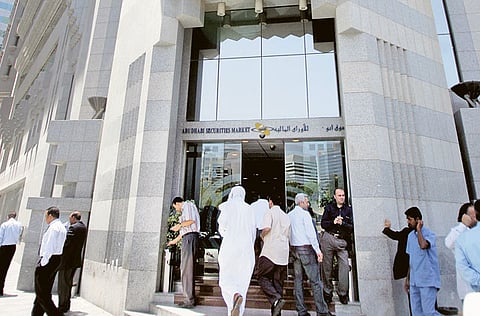UAE revives bourse merger proposal after huge aluminium deal
DFM, ADX merger could boost turnover, attract foreign institutions

Abu Dhabi/Dubai: The UAE has revived a proposal to merge its two main stock exchanges in a state-backed deal that could boost trade in the local market and attract more foreign investment to the Gulf state, sources familiar with the plan said.
Talks on a potential merger between the Dubai Financial Market (DFM) and the Abu Dhabi Securities Exchange (ADX) have occurred on and off since at least 2010.
There are no common listings on the exchanges; a merger could deepen the equity market of the Arab world’s second biggest economy, encouraging more companies to list their shares and international institutions to buy them.
But progress toward the proposed tie-up halted because of differences over how to value the exchanges, and because the two emirates were preoccupied with other issues such as the aftermath of Dubai’s 2009-2010 corporate debt crisis.
In recent weeks, however, officials in Abu Dhabi and Dubai have focused on the idea again, with the two emirates showing willingess to consolidate some of their business interests to compete in the global economy, the sources said.
“The entire valuation, structuring of the deal is done. It’s been an ongoing process and the decision is now pending at the highest authorities in the two emirates,” one source said.
“It’s not a question of whether they would do it now. It’s a question of when,” added the source, speaking on condition of anonymity as the matter has not been made public.
When contacted by Gulf News, a DFM spokesperson declined to comment. A person who Gulf News spoke to at ADX could not confirm any ongoing talks about a possible merger.
A source familiar with developments at the Securities & Commodities Authority (SCA) told Gulf News the UAE capital markets regulator would “encourage any decision the Abu Dhabi Securities Exchange and Dubai Financial Market take on the merger.”
He, however, couldn’t immediately confirm if the bourses in Dubai and Abu Dhabi have opened formal talks to explore the possibility of a merger in a bid to create one UAE stock market.
Mousa Haddad, Head Trader with National Bank of Abu Dhabi Asset Management told Gulf News it makes more sense to have one consolidated UAE stock market instead of two stock markets in Dubai and Abu Dhabi, especially after MSCI’s decision to upgrade the UAE markets to emerging market status from a frontier market.
More depth
“One UAE market will give more depth in terms of sectors. Also, the trading volumes will reflect much better and in the longer run, there would be increased liquidity given the greater interest of international investors in this market,” he added.
Valuation
The sources did not provide any valuation for the deal. DFM, which is the only listed Gulf stock exchange, has a market value of $4.4 billion; its stock price has nearly doubled this year and risen 51 per cent in the past month, as Dubai’s recovery from its debt crisis has accelerated.
DFM is 80 per cent owned by Borse Dubai, a holding company which also owns a 33 per cent stake in the Nasdaq Dubai bourse, as well as nearly 21 per cent of the London Stock Exchange, according to its website. Nasdaq Dubai is unlikely to be part of any merger, one source said.
Abu Dhabi and Dubai compete in many ways; they have rival airlines, and Abu Dhabi this year announced plans to develop an international financial centre that could eventually take business from Dubai in some areas.
But the emirates have also cooperated, and Abu Dhabi bailed out Dubai with a $10 billion loan during its crisis. Early this month, Dubai and Abu Dhabi decided to merge their state aluminium producers to create an entity with a combined enterprise value of $15 billion.
A second source said the merged exchange was likely to be owned 45 percent each by the Abu Dhabi and Dubai governments, and would most likely be called Emirates Bourse, with trading floors in both cities.
The remaining 10 per cent would be owned by minority shareholders, the source said, adding that the merger would involve the transfer of an undisclosed sum from Abu Dhabi to Dubai.
Benchmark
Companies listed on DFM, which include developer Emaar Properties and lender Emirates NBD, have a combined market capitalisation of about $47 billion. Stocks on the Abu Dhabi exchange, home to companies such as regional telecommunications giant Etisalat and National Bank of Abu Dhabi, have a market value of $94 billion, according to Thomson Reuters data.
DFM’s main stock index has gained 46 per cent so far in 2013 while Abu Dhabi is up 38 per cent, making these bourses among the best-performing globally. First-half trading volume on DFM more than doubled to 31 billion shares from 14.7 billion a year earlier.
Last week, equity index compiler Morgan Stanley Capital International decided to upgrade the UAE to emerging market from frontier market status, which is expected to attract hundreds of millions of dollars of institutional portfolio investment to the UAE.
Goldman Sachs Inc was hired by both Dubai and Abu Dhabi to advise on the possible merger in 2010. The US bank has retained the mandate and has been involved in the valuation process, two of the sources said.
— With inputs from Himendra Mohan Kumar, Staff Reporter
Sign up for the Daily Briefing
Get the latest news and updates straight to your inbox



